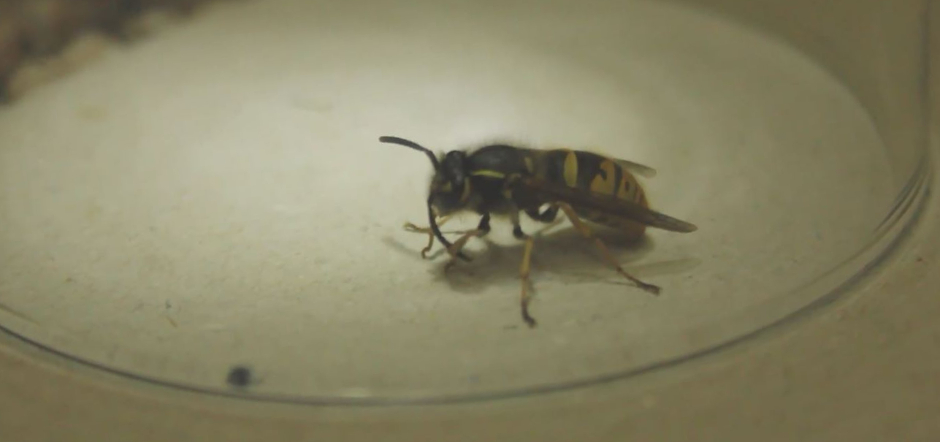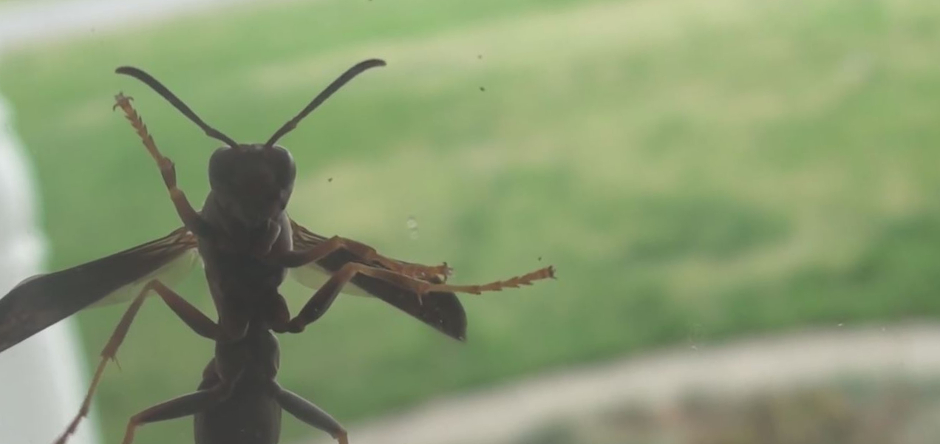How to Get Rid of Wasps
An educational guide to help you get rid of unwanted Wasps.
How To Get Rid Of Wasps
No one wants to deal with wasps on their property, particularly close to their home or even inside of it. Even if you aren’t allergic to their sting, it can be painful. To make matters worse, many types of wasps (although not all) are aggressive, meaning they will sting if they feel threatened. Even worse, many can sting more than once, unlike honey bees which only sting a single time and die. If you do get stung, wash the area using soap and water and apply ice. You should also take an antihistamine if you have one on hand and if you know you are allergic, get medical attention as soon as you are stung.

Find The Wasps
Before you can take steps to get rid of the wasps, you need to figure out exactly where they are hiding so you know the area to target. This is why a professional will always start by inspecting your home and property to find the wasp nests. You will also need to figure out what type of wasp you are dealing with; they can typically be divided into solitary or social wasps, which are fairly self-explanatory. Yellow jackets are social wasps that are extremely aggressive and territorial, being incredibly defensive of their nest. It is very likely that they will sting you multiple times before they die. They are the only type of wasp that is always considered a “pest” and should always be removed; the others will depend on the situation.
Solitary wasps will typically have long thin bodies and aren’t very colorful. These tend to be more docile and are unlikely to sting you. In fact, you should try to leave solitary wasps alone if you can (if they are outside) as they prey on beetles, aphids, and other pests that can hurt your garden. Another type of beneficial wasp you shouldn’t get rid of unless they are in your way or their nest is by human traffic is paper west. They are social wasps, but typically harmless. You can recognize paper wasps by their nests, which look like honeycomb without the typical outer shell.
What To Do About Bald Faced Hornets
Bald faced hornets are a type of wasp that looks scarier than they are. They are the most common type of hornet wasp and live in aerial nests that are large. Although they are territorial, they aren’t very aggressive. You can take care of them by spraying their nest with a pressurized wasp killer at night, from a distance for safety.
Get Rid Of Yellow Jackets
Because yellow jackets are the most aggressive types of wasps, you need to be very careful when taking care of them. You should find the nest and then fill it with enough poison so that you kill every single wasp in a single go. Otherwise, you will likely find yourself dealing with a group of angry wasps looking to sting you as many times as possible. To find the nest, just wait until dusk and watch the yellow jackets return to it. You can then use non-projectile wasp killer in a can to spray the nest. By spraying it at night, you are reducing the chances of wasps coming out to attack.

Use Citrus Oil Extract
A simple and completely natural way to kill a solitary wasp you see on your property is with citrus oil. If you are concerned about wasps in your garden and outside regularly, keep a spray bottle with this citrus oil extract; it will kill the wasps on contact.
Removing The Wasp Nest
After you have killed all of the wasps in question, you need to remove the nest, no matter the type of wasp that occupied it. Put on multiple clothing layers and a pair of gloves for some extra protection. You should always spray the wasp nest at night, focusing on the entrance and using a wasp killing agent. You should slowly back away from the area while the poison does its job. You may want to repeat the spraying process multiple times to ensure all wasps are dead.
Finally, you can take care of the nest itself. In the case of aerial nests, knock it down. At this point, you can either fill it with dirt or bag it (perhaps twice) before tossing it. In the case of nests in the ground, simply fill it up with gravel and dirt.
Extra Safety Precautions
Most of the time when dealing with wasps, you will use a chemical pesticide. Because of this, you need to take safety precautions to ensure you don’t breathe in too much of the chemical, such as trying to stand downwind from it. You should also avoid using these sprays around children or pets for safety reasons. Never target the wasp nest when others are around, especially pets, children, or the elderly and always wear protective clothing. The best way to ensure you aren’t stung is to just hire a professional to get rid of the wasps.
No one wants to deal with wasps on their property, particularly close to their home or even inside of it. Even if you aren’t allergic to their sting, it can be painful. To make matters worse, many types of wasps (although not all) are aggressive, meaning they will sting if they feel threatened. Even worse, many can sting more than once, unlike honey bees which only sting a single time and die. If you do get stung, wash the area using soap and water and apply ice. You should also take an antihistamine if you have one on hand and if you know you are allergic, get medical attention as soon as you are stung.

Find The Wasps
Before you can take steps to get rid of the wasps, you need to figure out exactly where they are hiding so you know the area to target. This is why a professional will always start by inspecting your home and property to find the wasp nests. You will also need to figure out what type of wasp you are dealing with; they can typically be divided into solitary or social wasps, which are fairly self-explanatory. Yellow jackets are social wasps that are extremely aggressive and territorial, being incredibly defensive of their nest. It is very likely that they will sting you multiple times before they die. They are the only type of wasp that is always considered a “pest” and should always be removed; the others will depend on the situation.
Solitary wasps will typically have long thin bodies and aren’t very colorful. These tend to be more docile and are unlikely to sting you. In fact, you should try to leave solitary wasps alone if you can (if they are outside) as they prey on beetles, aphids, and other pests that can hurt your garden. Another type of beneficial wasp you shouldn’t get rid of unless they are in your way or their nest is by human traffic is paper west. They are social wasps, but typically harmless. You can recognize paper wasps by their nests, which look like honeycomb without the typical outer shell.
What To Do About Bald Faced Hornets
Bald faced hornets are a type of wasp that looks scarier than they are. They are the most common type of hornet wasp and live in aerial nests that are large. Although they are territorial, they aren’t very aggressive. You can take care of them by spraying their nest with a pressurized wasp killer at night, from a distance for safety.
Get Rid Of Yellow Jackets
Because yellow jackets are the most aggressive types of wasps, you need to be very careful when taking care of them. You should find the nest and then fill it with enough poison so that you kill every single wasp in a single go. Otherwise, you will likely find yourself dealing with a group of angry wasps looking to sting you as many times as possible. To find the nest, just wait until dusk and watch the yellow jackets return to it. You can then use non-projectile wasp killer in a can to spray the nest. By spraying it at night, you are reducing the chances of wasps coming out to attack.

Use Citrus Oil Extract
A simple and completely natural way to kill a solitary wasp you see on your property is with citrus oil. If you are concerned about wasps in your garden and outside regularly, keep a spray bottle with this citrus oil extract; it will kill the wasps on contact.
Removing The Wasp Nest
After you have killed all of the wasps in question, you need to remove the nest, no matter the type of wasp that occupied it. Put on multiple clothing layers and a pair of gloves for some extra protection. You should always spray the wasp nest at night, focusing on the entrance and using a wasp killing agent. You should slowly back away from the area while the poison does its job. You may want to repeat the spraying process multiple times to ensure all wasps are dead.
Finally, you can take care of the nest itself. In the case of aerial nests, knock it down. At this point, you can either fill it with dirt or bag it (perhaps twice) before tossing it. In the case of nests in the ground, simply fill it up with gravel and dirt.
Extra Safety Precautions
Most of the time when dealing with wasps, you will use a chemical pesticide. Because of this, you need to take safety precautions to ensure you don’t breathe in too much of the chemical, such as trying to stand downwind from it. You should also avoid using these sprays around children or pets for safety reasons. Never target the wasp nest when others are around, especially pets, children, or the elderly and always wear protective clothing. The best way to ensure you aren’t stung is to just hire a professional to get rid of the wasps.
About Us
We are the Pest Education Network, a non-profit organization that focuses on wildlife and pest removal education. Our approach utilizes Integrated Pest Management, a strategy advocating prevention and humane methods.


